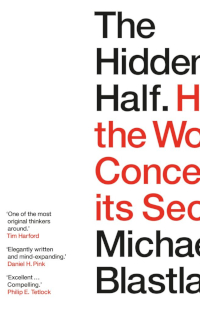The Hidden Half
How the World Conceals its Secrets
Michael Blastland
The Hidden Half is a book of mysteries and errors that expose our ignorance and uncertainty.
Here’s just one. A crayfish in the mid 1990s spontaneously started cloning itself – no males, all females – an entirely new species of clones, overnight, in a fish tank. There was no record of its existence in the wild.
This was amazing enough. But when scientists heard about them and put them in tanks to study, they went further: they also standardised the environment, rearing all the clones in exactly the same, carefully lab-controlled conditions. Now, everything was the same. Genes, and environment, the lot.
So, what did they look like? About the same? Maybe exactly the same? One was 20 times the weight of another. Every single one of several hundred studied had unique markings. They laid different numbers of eggs, had hugely different lifespans. They moved differently, rested differently, some liked a crowd, some were loners, some were dominant, some subservient. They were chalk and cheese.
Why? The short answer is we don’t know. At which point we are bound to what we are missing? What can explain this? And that’s the hidden half. There’s something out there that means when we look for patterns and order – how one thing causes another – we don’t see it clearly. The world hides its secrets.
Naturally, there are broad hypotheses and good evidence that there must be some kind of randomness or noise in the developmental process, either biological or environmental, but we have little understanding of how this works in detail to produce any particular outcome. We can’t trace cause and effect, and we are nowhere near being able to predict it – except for the most obvious and simple mutations.
The Hidden Half argues that the problem of hidden and disruptive influence is common, extends well beyond animal or human biology, and contributes to a collective blind-spot for the complexities of causality in economics, politics, research and elsewhere.
The usual culprits for this kind of problem are inside our heads: in cognitive limitation or bias. The Hidden Half by contrast locates the problem outside our heads as much as in, arising from the monstrously intricate nature of what’s out there to understand and analyse. The world doesn’t easily submit to the dreams of tidy minds. There’s a Hidden Half to what-causes-what that we repeatedly miss, and that often makes fools of us.
First published by Atlantic Books (UK) in April 2019.

Reviews
“Fascinating and provocative. Blastland is one of the most original thinkers around.”
Tim Harford – Financial Times columnist and author of The Undercover Economist
“Elegantly written and mind-expanding, The Hidden Half will enthrall you with its storytelling while educating you with its scientific depth.”
Daniel H. Pink – bestselling author of Drive
“Excellent. Blastland makes a compelling case that God is fond of playing dice with the cosmos-and the list of unpredictable things keeps growing, not shrinking.”
Phillip Tetlock – bestselling author of Superforecasting
“Brilliant. Blastland provides an explanation of the need for humility in the face of the inevitable limits to knowledge and our all-too-human temptation to tell stories about the world that go far beyond what the evidence will support.”
Diane Coyle – Bennett Professor of Public Policy, Cambridge University
“A terrific book! I read it quite literally in one sitting. Blastland makes a powerful case that sheer obliviousness to complexity and unpredictability is our collective mental blindspot. His examples, ranging from cloned crayfish, to criminal life-histories and GDP figures, are a delight.”
Nick Chater, Professor of Behavioural Science, Warwick Business School, and author of The Mind is Flat.
“Fascinating… As John Wooden said, it’s what you learn after you know it all that counts.”
Andrew Gelman – author of Rich State Poor State Red State Blue State
“Beautifully written and often very funny. Anyone making decisions that matter should enjoy this book and profit from its lessons.”
Dame Frances Cairncross – Chair, Executive Committee of the Institute for Fiscal Studies
“Packed with fascinating examples of our shaky understanding of ourselves and the world.”
Bobby Duffy – Director, the Policy Institute at King’s College London
“Original… enjoyable enough way to be read on a sun-lounger…thought-provoking.”
Sam Leith in Unherd
“Excellent *****”
Popular Science
“Skeptics will be sure of even less after reading Blastland’s book—and that’s a step in the right direction.”
Kirkus Review